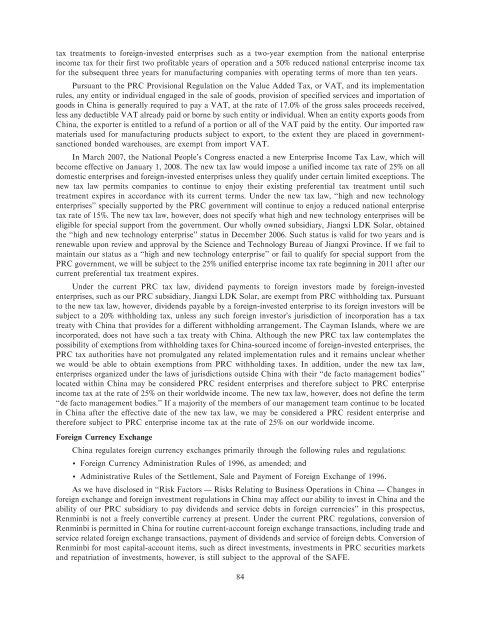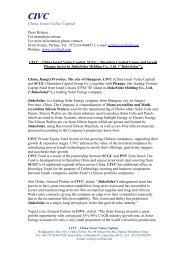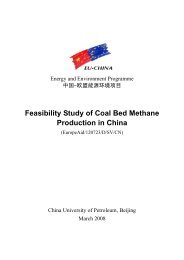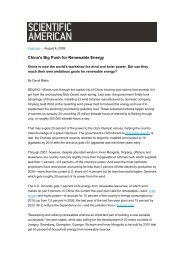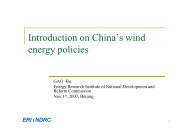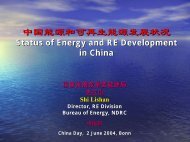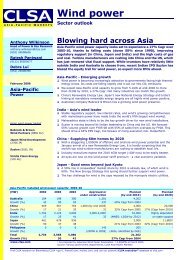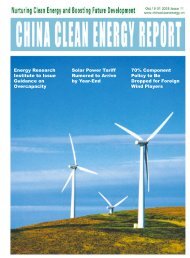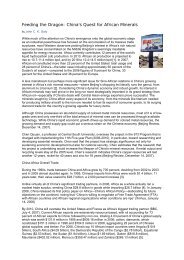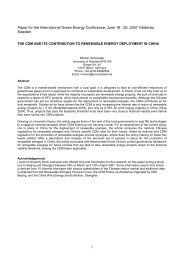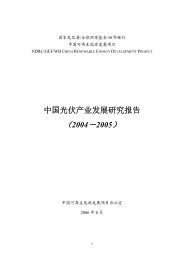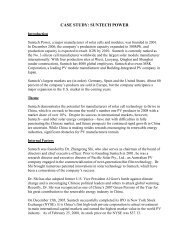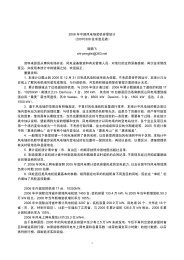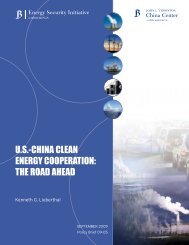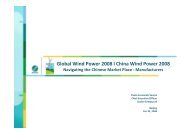LDK Solar Co., Ltd. - Asia Europe Clean Energy (Solar) Advisory Co ...
LDK Solar Co., Ltd. - Asia Europe Clean Energy (Solar) Advisory Co ...
LDK Solar Co., Ltd. - Asia Europe Clean Energy (Solar) Advisory Co ...
Create successful ePaper yourself
Turn your PDF publications into a flip-book with our unique Google optimized e-Paper software.
tax treatments to foreign-invested enterprises such as a two-year exemption from the national enterprise<br />
income tax for their first two profitable years of operation and a 50% reduced national enterprise income tax<br />
for the subsequent three years for manufacturing companies with operating terms of more than ten years.<br />
Pursuant to the PRC Provisional Regulation on the Value Added Tax, or VAT, and its implementation<br />
rules, any entity or individual engaged in the sale of goods, provision of specified services and importation of<br />
goods in China is generally required to pay a VAT, at the rate of 17.0% of the gross sales proceeds received,<br />
less any deductible VAT already paid or borne by such entity or individual. When an entity exports goods from<br />
China, the exporter is entitled to a refund of a portion or all of the VAT paid by the entity. Our imported raw<br />
materials used for manufacturing products subject to export, to the extent they are placed in governmentsanctioned<br />
bonded warehouses, are exempt from import VAT.<br />
In March 2007, the National People's <strong>Co</strong>ngress enacted a new Enterprise Income Tax Law, which will<br />
become effective on January 1, 2008. The new tax law would impose a unified income tax rate of 25% on all<br />
domestic enterprises and foreign-invested enterprises unless they qualify under certain limited exceptions. The<br />
new tax law permits companies to continue to enjoy their existing preferential tax treatment until such<br />
treatment expires in accordance with its current terms. Under the new tax law, ""high and new technology<br />
enterprises'' specially supported by the PRC government will continue to enjoy a reduced national enterprise<br />
tax rate of 15%. The new tax law, however, does not specify what high and new technology enterprises will be<br />
eligible for special support from the government. Our wholly owned subsidiary, Jiangxi <strong>LDK</strong> <strong>Solar</strong>, obtained<br />
the ""high and new technology enterprise'' status in December 2006. Such status is valid for two years and is<br />
renewable upon review and approval by the Science and Technology Bureau of Jiangxi Province. If we fail to<br />
maintain our status as a ""high and new technology enterprise'' or fail to qualify for special support from the<br />
PRC government, we will be subject to the 25% unified enterprise income tax rate beginning in 2011 after our<br />
current preferential tax treatment expires.<br />
Under the current PRC tax law, dividend payments to foreign investors made by foreign-invested<br />
enterprises, such as our PRC subsidiary, Jiangxi <strong>LDK</strong> <strong>Solar</strong>, are exempt from PRC withholding tax. Pursuant<br />
to the new tax law, however, dividends payable by a foreign-invested enterprise to its foreign investors will be<br />
subject to a 20% withholding tax, unless any such foreign investor's jurisdiction of incorporation has a tax<br />
treaty with China that provides for a different withholding arrangement. The Cayman Islands, where we are<br />
incorporated, does not have such a tax treaty with China. Although the new PRC tax law contemplates the<br />
possibility of exemptions from withholding taxes for China-sourced income of foreign-invested enterprises, the<br />
PRC tax authorities have not promulgated any related implementation rules and it remains unclear whether<br />
we would be able to obtain exemptions from PRC withholding taxes. In addition, under the new tax law,<br />
enterprises organized under the laws of jurisdictions outside China with their ""de facto management bodies''<br />
located within China may be considered PRC resident enterprises and therefore subject to PRC enterprise<br />
income tax at the rate of 25% on their worldwide income. The new tax law, however, does not define the term<br />
""de facto management bodies.'' If a majority of the members of our management team continue to be located<br />
in China after the effective date of the new tax law, we may be considered a PRC resident enterprise and<br />
therefore subject to PRC enterprise income tax at the rate of 25% on our worldwide income.<br />
Foreign Currency Exchange<br />
China regulates foreign currency exchanges primarily through the following rules and regulations:<br />
‚ Foreign Currency Administration Rules of 1996, as amended; and<br />
‚ Administrative Rules of the Settlement, Sale and Payment of Foreign Exchange of 1996.<br />
As we have disclosed in ""Risk Factors Ì Risks Relating to Business Operations in China Ì Changes in<br />
foreign exchange and foreign investment regulations in China may affect our ability to invest in China and the<br />
ability of our PRC subsidiary to pay dividends and service debts in foreign currencies'' in this prospectus,<br />
Renminbi is not a freely convertible currency at present. Under the current PRC regulations, conversion of<br />
Renminbi is permitted in China for routine current-account foreign exchange transactions, including trade and<br />
service related foreign exchange transactions, payment of dividends and service of foreign debts. <strong>Co</strong>nversion of<br />
Renminbi for most capital-account items, such as direct investments, investments in PRC securities markets<br />
and repatriation of investments, however, is still subject to the approval of the SAFE.<br />
84


